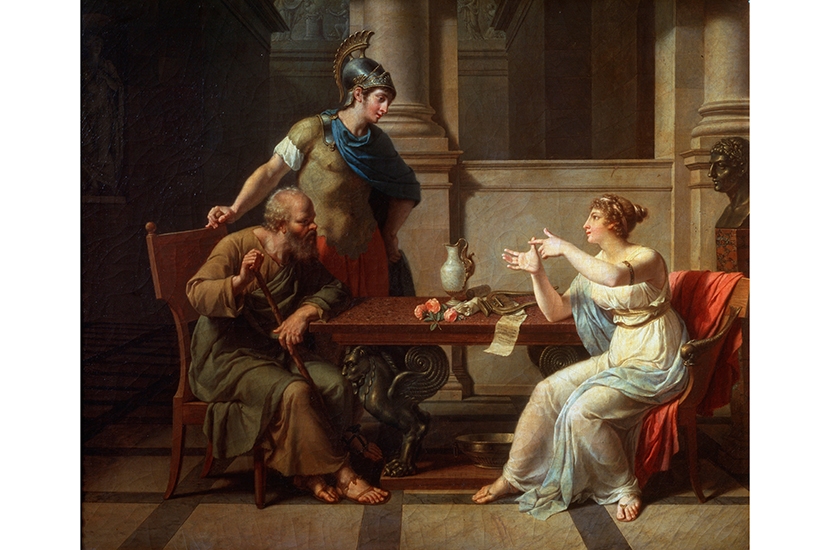I’m on my way to Patmos, an island so difficult to get to, it has kept the great unwashed away. From now it is the only island I will grace with my presence, until the next time, that is.
It was Kipling who quipped about journalists having ‘power without responsibility’. He then added the phrase ‘the prerogative of the harlot throughout the ages’, which was repeated by Stanley Baldwin, not Stanley Johnson. Comparing hacks to harlots is, of course, unfair to the girls. Some of them have risen to the highest offices in the past due to their discretion, whereas the only journalist I know who made it to the top is our very own Boris. Hookers are more to be trusted than hacks, insisted my late father, who also claimed that whores enjoyed a seismographic alertness to future winners which far exceeds that of the hacks.
The definition of the word ‘prostitute’ is a man or a woman who indulges in sexual intercourse for money. But more to the point, it is someone who debases his or her talent in the pursuit of money, and this extends to writers, painters and of course journalists. Needless to say, newspapers and TV networks also fall into this category, from the BBC and NBC to the biggest one of all, CNN.
I remember when, back in 1963, people wondered how John Profumo, a cabinet minister, could betray his beautiful film star wife Valerie Hobson for a part-time hooker, Christine Keeler. How little they knew. The lovelier the wife, the more fun it is to cheat. Tom Wolfe called it ‘nostalgie de la boue’. Yet it is an unjust world, because although Profumo was justly rehabilitated, Christine ended up an outcast and broke. Harlots have been mistrusted and maligned as far back as the Bible. Samson was the Netanyahu of his day, pummeling the Philistines in Palestine, but he met his match in Delilah, who was most certainly a hooker. Samson was suppressing the Palestinians, and Delilah got her revenge as well as the bum rap of history. She was, unlike a lot of prostitutes in France during World War Two, resistance personified. The journalist Martin Bashir lied, invented, and presented phony bank statements in order to convince Diana that the palace and her ex-hubby were plotting against her. The BBC rewarded him by making him its religious affairs correspondent. Fernande Grudet went from the street to become Madame Claude, France’s greatest madame, but ended up dead broke and in prison because she refused to betray clients who included President Giscard d’Estaing, not to mention cabinet ministers, industrialists, ship owners, aristocrats, and yours truly. See what I mean? Journalists swallowed the weapons of mass destruction whopper because it suited them, being too lazy or intimidated to challenge Bush and Blair. One million Iraqi dead later, B&B remain the Fourth Estate’s darlings.
The Ancient Greeks were so obsessed with courtesans that one of them, Aspasia, companion to the greatest of them all, Pericles, ended up running the country. ‘She told Pericles what to do and he did it,’ wrote Plutarch in his Life of Pericles. Mind you, a courtesan and a harlot are not one and the same. (Courtesans are like editors, and harlots are the reporters.) Pericles regarded Aspasia as a philosopher and politician. Socrates, in fact, came to see her with his disciples, although she ran a disreputable business because she trained young ‘hetaerae’. According to some Greek historians, Lysicles the sheep-seller, a man of humble birth, became the most important man in Athens because he lived with Aspasia after Pericles’s death.
The mind boggles at man’s folly when reading history: Pericles listened to his nephew Alcibiades and invaded Sicily rather than Sparta, and lost the Peloponnesian war, just as that halfwit Bush listened to Wolfowitz and invaded Iraq rather than fight al Qaeda. I wonder who the harlots are in the mess that’s been the Middle East since? Daniel Defoe inverted Kipling’s quip before it was made in his novel Moll Flanders. He juxtaposed the phenomenon of the South Sea bubble with the fortunes of his heroine Moll. The men of power bankrupted the country and took no responsibility, while the press failed to reveal the details of the scheme, whereas the honest trollop Moll Flanders gave real pleasure for money that she made the old-fashioned way (that is to say, she earned it).
The art critic Robert Hughes wrote in his opus The Fatal Shore how one in five women transported to the antipodes between 1788 and 1852 were ‘on the town’, a euphemism for you-know-what. No wonder Australians and Kiwis are, along with South Africans, my favorite people. The French, of course, excelled in the sexual liberation of women while the Americans were still burning so-called witches. From Madame de Pompadour to Madame du Barry, both of whom serviced Louis XV, to the Belle Epoque to Madame Claude, the great Parisian horizontales took pride in their vocation and responsibility for their power. That’s more than I can say for the pompous, self-important and sycophantic journalists at Bezos’s Washington Post and Sulzberger’s New York Times.
Poor old Kipling, he got many things right but blew this one. Power without responsibility pertains to journalism in all its forms.
This article was originally published in The Spectator’s UK magazine. Subscribe to the World edition here.


















